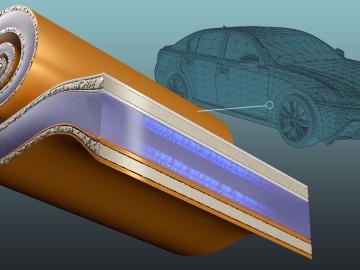
Filter News
Area of Research
- Advanced Manufacturing (2)
- Biology and Environment (13)
- Building Technologies (3)
- Computational Biology (1)
- Computational Engineering (1)
- Computer Science (4)
- Energy Science (72)
- Fusion and Fission (2)
- Isotope Development and Production (1)
- Isotopes (10)
- Materials (36)
- Materials for Computing (9)
- National Security (12)
- Neutron Science (17)
- Nuclear Science and Technology (6)
- Quantum information Science (4)
- Supercomputing (33)
- Transportation Systems (2)
News Type
News Topics
- (-) Biomedical (28)
- (-) Buildings (36)
- (-) Cybersecurity (20)
- (-) Isotopes (25)
- (-) Quantum Science (42)
- (-) Space Exploration (13)
- (-) Transportation (62)
- 3-D Printing/Advanced Manufacturing (82)
- Advanced Reactors (25)
- Artificial Intelligence (51)
- Big Data (25)
- Bioenergy (42)
- Biology (47)
- Biotechnology (14)
- Chemical Sciences (48)
- Clean Water (16)
- Composites (23)
- Computer Science (105)
- Coronavirus (28)
- Critical Materials (23)
- Education (3)
- Element Discovery (1)
- Emergency (1)
- Energy Storage (75)
- Environment (86)
- Exascale Computing (14)
- Fossil Energy (2)
- Frontier (17)
- Fusion (26)
- Grid (38)
- High-Performance Computing (44)
- Hydropower (6)
- Irradiation (2)
- ITER (5)
- Machine Learning (27)
- Materials (96)
- Materials Science (90)
- Mathematics (3)
- Mercury (5)
- Microelectronics (1)
- Microscopy (28)
- Molten Salt (8)
- Nanotechnology (41)
- National Security (21)
- Neutron Science (81)
- Nuclear Energy (47)
- Partnerships (33)
- Physics (30)
- Polymers (23)
- Quantum Computing (18)
- Security (13)
- Simulation (19)
- Statistics (2)
- Summit (30)
Media Contacts

Strengthening the competitiveness of the U.S. transportation industry depends on developing domestic EV batteries that combine rapid charging with long-range performance — two goals that often conflict. Researchers at ORNL have addressed this challenge by redesigning a key battery component, enabling fast, 10-minute charging while improving energy density and reducing reliance on copper.

Researchers at ORNL have developed a tool that gives builders a quick way to measure, correct and certify level foundations. FLAT, or the Flat and Level Analysis Tool, examines a 360-degree laser scan of a construction site using ORNL-developed segmentation algorithms and machine learning to locate uneven areas on a concrete slab.

A research team from the Department of Energy’s Oak Ridge National Laboratory, in collaboration with North Carolina State University, has developed a simulation capable of predicting how tens of thousands of electrons move in materials in real time, or natural time rather than compute time.

Working in collaboration with researchers from Oak Ridge National Laboratory, D-Wave Quantum Inc., a quantum computing systems, software and services provider, has shown its annealing quantum computing prototype has the potential to operate faster than the leading supercomputing systems.
Scientists at ORNL have developed a method that can track chemical changes in molten salt in real time — helping to pave the way for the deployment of molten salt reactors for energy production.

Working at nanoscale dimensions, billionths of a meter in size, a team of scientists led by ORNL revealed a new way to measure high-speed fluctuations in magnetic materials. Knowledge obtained by these new measurements could be used to advance technologies ranging from traditional computing to the emerging field of quantum computing.

Researchers at ORNL joined forces with EPB of Chattanooga and the University of Tennessee at Chattanooga to demonstrate the first transmission of an entangled quantum signal using multiple wavelength channels and automatic polarization stabilization over a commercial network with no downtime.

The Department of Energy has awarded an $88.8 million contract to Hensel Phelps for the construction of a facility to enrich stable isotopes at Oak Ridge National Laboratory.

A new technology to continuously place individual atoms exactly where they are needed could lead to new materials for devices that address critical needs for the field of quantum computing and communication that cannot be produced by conventional means.

ORNL has partnered with Western Michigan University to advance intelligent road infrastructure through the development of new chip-enabled raised pavement markers. These innovative markers transmit lane-keeping information to passing vehicles, enhancing safety and enabling smarter driving in all weather conditions.


